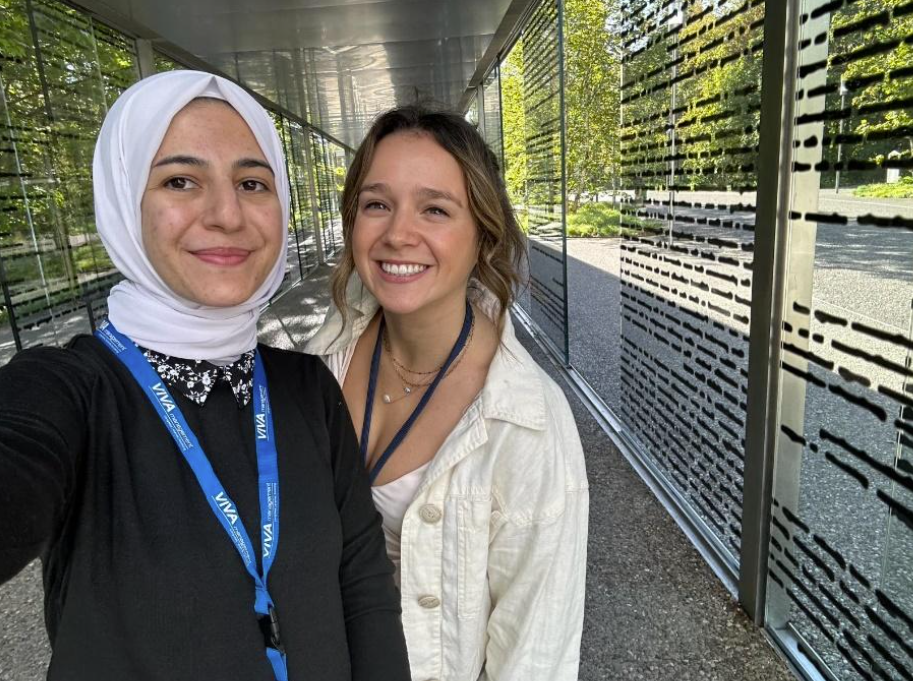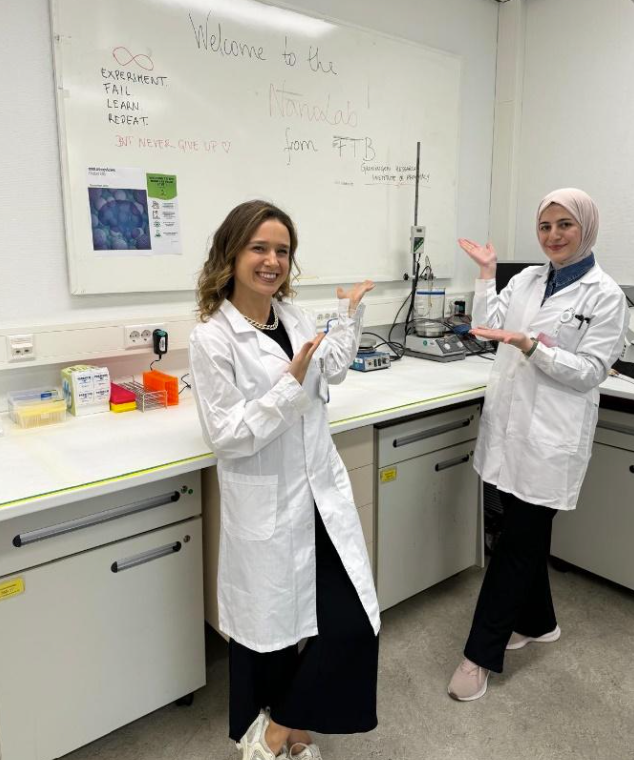CRS Labs Around the World: Sousa Lab
Sousa Lab

Dr. Flávia Sousa is a Tenure-Track Assistant Professor at the Department of Pharmaceutical Technology and Biopharmacy, Groningen Research Institute of Pharmacy, University of Groningen, Netherlands. She holds a background in pharmacy and earned her Ph.D. in Biomedical Sciences from the University of Porto, Portugal. Following her doctoral studies, Dr. Sousa pursued postdoctoral research at Imperial College London, subsequently securing a prestigious Marie Curie MINDED fellowship at the Istituto Italiano di Tecnologia, Italy (2021-2022), and an independent Women-in-Science (WINS) research fellowship from NCCR Bio-inspired Materials at the Adolphe Merkle Institute, Fribourg, Switzerland. Dr. Sousa's groundbreaking work has led to promising advancements in brain cancer treatment, earning prestigious international grants and awards, including the Fulbright program, the Marie-Sklodowska-Curie Fellowship, MIT Innovators Under 35, and the Female Science Talents 2023.
Glioblastoma treatment with nanomedicine
As a drug delivery scientist, Dr. Sousa is at the forefront of developing innovative biological nanotherapies for brain cancer treatment. Nowadays, immunostimulatory cytokines and monoclonal antibodies (mAbs) are powerful anti-cancer biopharmaceuticals. However, their systemic administration is often accompanied by a short half-life and significant toxicity that limit dosing, thereby compromising therapeutic efficacy. During the last 7 years, she has obtained extensive solid data on the development of nanobiopharmaceutics for brain cancer treatment. Concretely, she has been working on the development of biodegradable polymeric nanocarriers encapsulating cytokines and monoclonal antibodies to efficiently deliver mAbs directly to the brain, using a biodegradable nanodelivery system. Her research interest is also related to investigating molecular mechanisms for how biomacromolecules and Drug delivery systems interact with their targets.
Engineering nanomaterials for non-viral gene therapies
Over the years, Glioblastoma (GBM) remains the most common and deadly primary malignant brain cancer in human adults. Despite several existing drugs and promising nanomedicines to treat GBM, the key challenge remains: how to efficiently deliver drugs into the brain and achieve the best therapeutic response with minimum side effects? How to target the invasive GBM cancer cells and reverse the well-known highly immunosuppressive environment? Even though immunotherapy holds great promise for solid cancers, GBM is unresponsive to the current systemic therapy due to the hostile immunosuppressive GBM microenvironment. This immunologically cold tumor abrogates T-cell infiltration and activation, promoting cancer growth and invasiveness. It is therefore essential that the unique immunosuppressive microenvironment is primarily focused when developing a strategy to activate the immune reactions. The Sousa Lab is committed to advancing the field of immunotherapy through cutting-edge developments in non-viral vectors, creating the next generation of nanovaccines for cancer treatment. Our research focuses on smart, targeted platforms designed for highly selective therapies for brain cancer, working within the complex tumor microenvironment. We believe in the power of precision medicine, and our work aims to develop formulations that interact seamlessly with the immune system, paving the way for clinically translatable solutions.
Other contributions to the research community and society
Dr. Sousa’s motivation extends beyond discovering new scientific facts and drug discovery; she is also deeply committed to serving society by advancing science and educating the next generation of researchers. Recently, she was invited to create the first-ever scientific prize sponsored by a city wall in Portugal (Prize Dr. Mário Fonseca) for a junior researcher, with a one-year duration and a total fund of €20,000. Advocating for science and nurturing future scientists is one of her central goals. In line with this, she created a podcast, Re-think Science, to address issues of equity, diversity, and inclusion. As a member of the Equity, Diversity, and Inclusion Board of the Controlled Release Society, Dr. Sousa works to foster a more inclusive academic environment.
In May 2023, she moderated a panel on “Feminist Knowledge Transfer in Academia” at the International Spring Gathering of Falling Walls Female Science Talents in Berlin, discussing strategies to create inclusive academic spaces. Furthermore, she delivered a TEDx talk titled “How Can We Stop Scientists from Leaving Academic Life,” aiming to inspire future scientists to pursue science driven by passion rather than competition.

Relevant references:
- F. Haamedat, B. Mendes, J. Conniot, L. D. Di Filippo, M. Chorilli, A. Schroeder, J. Conde*, F. Sousa*, Engineered nanomaterials for glioblastoma nanovaccination, Nat Rev Mat, 2024 – Featured on Cover
- F. Sousa*, Emerging cytokine delivery with nanomedicine for brain cancer treatment, Expert Opin Drug Deliv, 2024, doi: 10.1080/17425247.2024.2347320
- F. Sousa*, H. Lee, M. Almeida, A. Bazzoni, B. B. Rother-Rutishauser, A. Petri-Fink, Immunostimulatory nanoparticles delivering cytokines as a novel cancer nanoadjuvant to empower glioblastoma immunotherapy, Drug Deliv Transl Res, 2023
- F. Sousa, A.I. Costa-Pereira, A. Cruz, F.J. Ferreira, M. Gouveira, J. Bessa, B. Sarrmento, R.D.M. Travasso, I.M. Pinto, Intratumoral VEGF nanotrapper reduces glioblastoma vascularization and tumor cell mass, J Control Release, 2021, doi:10.1016/j.jconrel.2021.09.031
- J. Finbloom, F. Sousa, M. M. Stevens, T.A. Desai, Engineering the Drug Carrier Biointerface to Overcome Biological Barriers to Drug Delivery, Adv. Drug Deliv. Rev., 2020, 167: 89-108
- F. Sousa, H.K. Dhaliwal, F. Gattacceca, B. Sarmento, M. Amiji, Enhanced Anti-angiogenic effects of bevacizumab in glioblastoma treatment upon intranasal administration in polymeric nanoparticles, J. Control Release, 2019, 22;309:37-47
- F. Sousa, A. Cruz, P. Fonte, I. M. Pinto, M. T. Neves-Petersen, B. Sarmento, A new paradigm for antiangiogenic therapy through controlled release of bevacizumab from PLGA nanoparticles, Sci. Rep. 2017, 7, 3736

